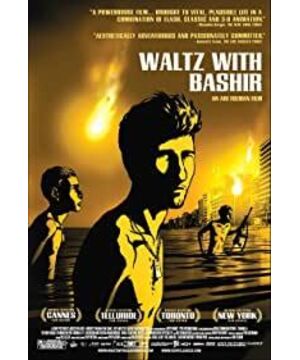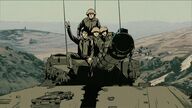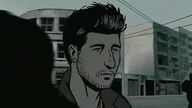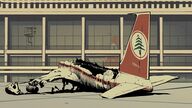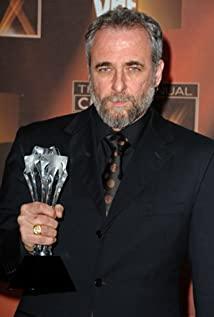A former Israeli soldier who participated in the Lebanon War lost all the memories of the war twenty years ago, so he searched for his comrades in arms and other people related to them in order to reconstruct that lost memory. This is very similar to the story of Rashomon. The narratives of the comrades-in-arms overlapped, dislocated, and fractured. Although they could barely piece together a fragmented "story" about war, it seemed that there was no reliability at all.
Memory is alive. It will be selective with people's growth and experience, but I never believe that memory "suicides" because of pain. Choosing to forget is understandable, but total loss is unforgivable. The personal self-protection torn by the strong tension of ethnic conflicts, so that the pathological memory is automatically abandoned? Darwin's theory of evolution should not agree with this view. Individuals in a nation that forget their past existence are weak. If they don't even have the capacity to bear it, they should be eliminated as soon as possible. So in my opinion, the protagonist of this film has no charm at all. He just acts as an incompetent clue character, traveling around the world, presenting the "story" to the viewer.
How terrible is the war? The scary thing is that human beings lose their minds in it and become emotionally annihilated in the eyes of bystanders. Individuals on both sides of the war were all victims. How many people truly believed in the role of war and "died their lives for the country"? The young people on the battlefield are not fanatical believers in force. They are suddenly pushed to the battlefield at the age of laughter. Individuals in extreme conditions lose the right to choose. This is where the "inhuman" of war lies. It makes people thoroughly. Forget that oneself is a "person" with free choice. There is a thought-provoking section in the film. A war reporter recalled that when he was with the army, he regarded the war as a set of news photos: ruins, soldiers killed in battle, shells flying across the sky...until he saw Beirut racing. The horses slaughtered in the field flowed into rivers of blood, surrounded by carrionists, dying. He thought: Those horses are innocent, why kill them? What irony, a person in war didn't move his kind heart until he saw a dying horse, and thought of the word "innocent", what a sad and desperate state it was. The state of war has become numb, and killing is regarded as the norm. It is terrifying that the pity in my heart cannot be reawakened until the death of animals is seen.
Talking about the massacre itself again, it made me feel speechless about the nation’s “amnesia”. I don’t know how deep the origins of the Palestine-Israel conflict are and whether I want to trace the “Genesis”, but I understand there is an old saying in China. ——Compare your heart to yourself. As a Jew, who had just broken free from the fate of genocide in World War II, the haze of Auschwitz should still be lingering in my heart, but in a blink of an eye, Israel, backed by the United States, turned to deal with Palestine. The innocent refugees in Beirut refugee camps were not the same as yesterday. "I"? Why did they succeed? ! After the war, the land of the State of Israel is a Middle Eastern country. The living standard of the Israeli people is higher than that of Palestine. Why do they live in bungalows and still covet other people's dilapidated refugee camps? They know that their lives today are hard to come by, why would they trample on the lives and dignity of others with shells and tanks? This kind of amnesia is unforgivable. In this ongoing war in the past and now, I condemn this country and nation even more because of Israel’s past.
At the end of the film, the scene changed from animation to record. Those Palestinian women who were crying and crying continued to cry for the world... They should be crying about whether Allah really exists, and why did he have the heart to let such a tragic thing happen? The story should have no other power besides condemnation, not to mention the people standing in front of Rason's door are all hesitating.
View more about Waltz with Bashir reviews


